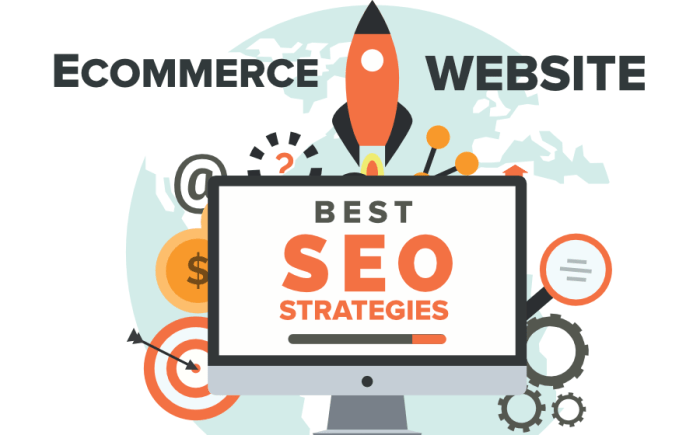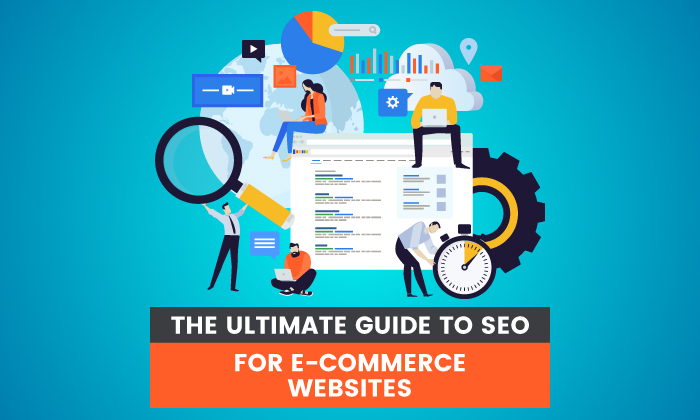SEO for E-commerce Websites – for E-commerce Websites is all about dominating the digital marketplace and skyrocketing your sales with strategic optimization tactics. Get ready to dive into the world of online visibility and revenue growth like never before.
From on-page strategies to off-page techniques, content marketing, and technical aspects, this guide has got you covered with everything you need to know to crush it in the e-commerce game.
Importance of for E-commerce Websites: SEO For E-commerce Websites

is like the secret sauce that makes your e-commerce website stand out in the digital jungle. It’s all about getting your site to rank higher on search engine results pages, so potential customers can easily find you.
Increased Online Visibility, SEO for E-commerce Websites
Optimizing your e-commerce site for search engines can significantly boost your online visibility. When your site appears higher in search results, more people are likely to click on it, increasing the chances of generating organic traffic.
Improved Online Sales
By implementing effective strategies, you can attract more qualified leads to your e-commerce website. These are users who are actively searching for products or services you offer, making them more likely to convert into paying customers. As a result, can directly impact your online sales and revenue.
Competitive Advantage
In the highly competitive e-commerce landscape, having a strong strategy can give you a competitive edge. By outranking your competitors in search results, you can capture a larger share of the market and establish your brand as a leader in your industry.
Enhanced User Experience
Optimizing your site for search engines also means improving the overall user experience. From faster loading times to mobile responsiveness and user-friendly navigation, can help create a seamless and engaging shopping experience for your customers.
Long-Term Results
Unlike paid advertising, the benefits of are long-lasting. Once you’ve established a solid foundation with optimized content and a strong backlink profile, your e-commerce site can continue to attract organic traffic and generate sales for months or even years to come.
On-page Strategies for E-commerce Websites

When it comes to optimizing e-commerce websites for search engines, on-page strategies play a crucial role in improving visibility and driving organic traffic. By focusing on key tactics specific to e-commerce sites, you can enhance the performance of your online store and attract more potential customers.
Optimizing Product Pages for Better Search Engine Visibility
To optimize product pages for better search engine visibility, consider the following strategies:
- Utilize high-quality product descriptions with relevant s to improve search engine rankings.
- Optimize product images with descriptive alt text to enhance visibility in image searches.
- Create unique and compelling meta titles and descriptions for each product page to increase click-through rates.
- Implement structured data markup to provide search engines with additional information about your products.
Importance of Meta Tags, URLs, and Internal Linking for
Meta tags, URLs, and internal linking are essential components of on-page for e-commerce websites:
- Meta tags, including title tags and meta descriptions, help search engines understand the content of your pages and improve click-through rates.
- Optimize URLs by including relevant s and creating user-friendly, descriptive URLs that are easy for both search engines and users to navigate.
- Internal linking helps search engines discover and index new pages on your site, improves website navigation, and distributes link equity throughout your site.
Off-page Techniques for E-commerce Websites
When it comes to off-page for e-commerce websites, there are several effective strategies that can help improve your site’s rankings and visibility. One key aspect of off-page is building quality backlinks from reputable websites. Backlinks act as a vote of confidence for your site, signaling to search engines that your content is valuable and trustworthy. Additionally, social media marketing plays a crucial role in supporting off-page efforts, as it can help drive traffic to your site and increase brand awareness.
Role of Backlinks in Improving E-commerce Site Rankings
Building high-quality backlinks is essential for improving your e-commerce site’s rankings. When reputable websites link back to your site, it signals to search engines that your content is authoritative and relevant. This can help boost your site’s credibility and increase its visibility in search engine results pages. However, it’s important to focus on earning backlinks from reputable sites within your industry to ensure the best results.
Social Media Marketing to Support Off-page Efforts
Social media marketing can play a significant role in supporting your off-page efforts. By sharing your content on social media platforms, you can increase visibility, drive traffic to your site, and engage with your audience. Additionally, social signals such as likes, shares, and comments can indicate to search engines that your content is valuable and relevant. By incorporating social media marketing into your off-page strategy, you can boost your site’s rankings and reach a wider audience.
Content Marketing for in E-commerce
Content marketing plays a crucial role in boosting for e-commerce websites. By creating high-quality and engaging content, websites can improve their search engine rankings, attract more organic traffic, and ultimately drive sales.
Importance of High-Quality Product Descriptions and Blog Posts
Product descriptions and blog posts are essential components of content marketing for in e-commerce. Here’s why:
- Product Descriptions: High-quality product descriptions not only help customers understand the features and benefits of a product but also improve by incorporating relevant s. They can also increase the likelihood of a conversion by providing detailed information.
- Blog Posts: Blog posts are a great way to engage with your target audience, provide valuable information, and establish your website as an authority in your industry. They can also help drive organic traffic to your site through relevant s and internal linking.
Tips for Creating Engaging Content
When creating content for e-commerce websites, it’s important to keep the target audience in mind and tailor the content to their needs and interests. Here are some tips for creating engaging content:
- Research s: Conduct research to identify relevant and high-volume s that can be incorporated into your content.
- Write Compelling Headlines: Use catchy headlines to grab the attention of your audience and entice them to click on your content.
- Include Visuals: Incorporate images, infographics, and videos to make your content more visually appealing and engaging.
- Optimize for : Use relevant s, meta tags, and internal links to optimize your content for search engines.
- Provide Value: Make sure your content provides value to your audience by answering their questions, solving their problems, or entertaining them.
Technical for E-commerce Websites
When it comes to optimizing an e-commerce website for search engines, technical plays a crucial role in improving visibility and driving organic traffic. Let’s dive into some key technical aspects that are essential for the success of e-commerce sites.
Optimizing Site Speed
Slow-loading websites can have a negative impact on user experience and performance. To optimize site speed, make sure to minimize HTTP requests, enable browser caching, compress images, and utilize a content delivery network (CDN) to reduce server response time.
Ensuring Mobile Responsiveness
With the increasing number of mobile users, it’s vital for e-commerce websites to be mobile-friendly. Implement responsive design, test mobile usability, and optimize for mobile page speed to provide a seamless experience across all devices.
Enhancing Crawlability
Search engine bots need to crawl and index your e-commerce site effectively. Create an XML sitemap, fix broken links, use robots.txt to control access to certain pages, and ensure proper URL structure to enhance crawlability and indexation.
Role of Structured Data and Schema Markup
Structured data and schema markup help search engines understand the content of your e-commerce site better. Implement schema markup for product pages, reviews, pricing, and other relevant information to enhance visibility in search results and drive more qualified traffic.





